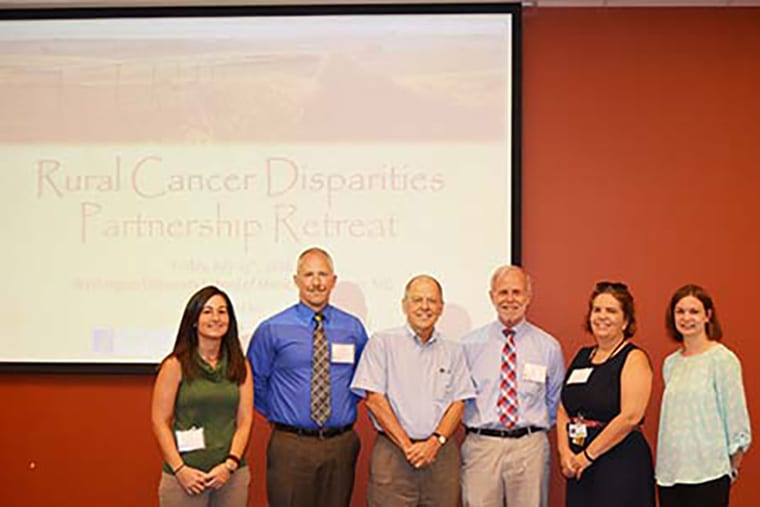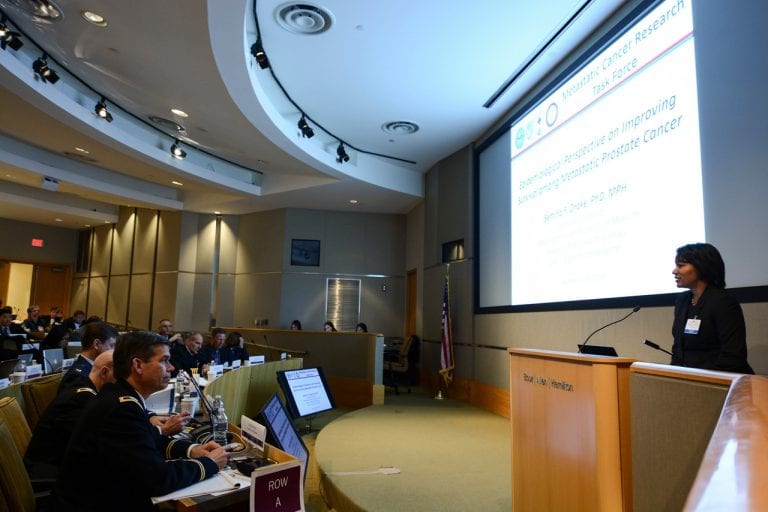
The Cancer Control Continuum, also known as the Cancer Care Continuum, has been used since at least the mid-1970s to describe the various points from cancer prevention, detection, diagnosis, treatment, and survivorship.
The cancer control continuum is a useful framework on which to view plans, progress, and priorities. This model helps our faculty members identify research gaps, where we must collaborate with other clinicians and researchers, institutions, and community members to have an impact for patients. This also allows our faculty to understand where more resources may be needed.
View more information about the cancer care continuum through the National Cancer Institute.
Related projects
Explore how our research projects intersect with various points on the cancer continuum. Click on a point in the continuum to view related projects.
View all projects related to the cancer care continuum below.

Addressing Rural Cancer Health Disparities: SCC-SIUSM Partnership
Faculty involved: Graham Colditz, Aimee James, Erin Linnenbringer, Mary Politi, Siobhan Sutcliffe
The partnership between The Southern Illinois University School of Medicine and Siteman Cancer Center investigates rural cancer disparities and ways to help educate, train, and implement effective strategies to reduce the disparities seen in rural communities.

CER of Encounter Decision Aids for Early-Stage Breast Cancer
Faculty involved: Mary Politi
As a co-investigator on the PCORI grant and PI of the subaward from Dartmouth College, Dr. Politi aims to support women of low socioeconomic status through early-stage breast cancer treatment decisions by providing patients with point-of-care decision aids.
Child asthma exacerbation: Role of caregiver risk beliefs
Faculty Involved: Erika Waters, Jean Hunleth
Drs. Waters, Hunleth, and colleagues will used a mixed methods research design to gain in-depth understanding of the psychological and social factors that shape the decision making process that caregivers use to care for their asthmatic children. This project will provide evidence-based behavioral strategies to improve the lives of 6.2 million children who are affected by asthma.
Chronic Diseases Related to Obesity
Faculty involved: Su-Hsin Chang, Graham Colditz
The project will study obesity, the coexistence of obesity-related chronic diseases, and mortality in the United States in terms of life expectancy and lifetime healthcare.
Communicating Multiple Disease Risks
Faculty involved: Erika Waters, PhD, MPH
This study, Communicating Multiple Disease Risks: A Translation of Risk Prediction Science, translates epidemiological data about five major health consequences of insufficient physical activity into a visual display that conveys individualized risk estimates in a way that is understandable and meaningful to diverse lay audiences and motivates physical activity behavior.
Community Engagement in Research
Faculty involved: Mary Politi, Bettina Drake, Esther Lu, Aimee James, Jean Hunleth, Erika Waters, PhD, MPH, Vetta Sanders Thompson, Graham Colditz
This line of research strives to engage all members of the community throughout the research process to help navigate the healthcare process.

Community Outreach: Mobile Mammography Van
Faculty involved: Bettina Drake, Graham Colditz, Su-Hsin Chang
This project worked towards increasing and providing effective mammography screening for women in the St. Louis area.
Dietary Habits in Rural Guatemala Adolescent Women
Faculty involved: Yikyung Park
This project addresses poor dietary and physical activity habits in rural Guatemalan adolescent women.
Disparities in Adherence to Adjuvant Therapy for DCIS and Outcomes
Faculty involved: Ying Liu
Ying Liu, MD, PhD, assistant professor of surgery, has received a three-year, research scholar grant from the American Cancer Society to study disparities associated wtih ductal carcinoma in situ (DCIS).
Disparities in Young-Onset Colorectal Cancer Survival
Faculty involved: Yin Cao
Dr. Yin Cao received a Young Investigator Award from the National Comprehensive Cancer Network. This two-year award will support Dr. Cao in her work addressing colorectal cancer survival disparities among patients diagnosed under age 50 through integrating patients, treatment, and tumor molecular characteristics.

Effect of Diabetes & Obesity on Disparities in Prostate Cancer Outcomes
Faculty involved: Bettina Drake
In this Department of Defense project, Dr. Drake and colleagues utilize a prostate cancer cohort from the VA hospitals to explore the association between obesity and prostate cancer recurrence, and its outcome on patient health.
Etiology of Young-Onset Colorectal Cancer
Faculty involved: Yin Cao
About 11% of colon cancers (CRC) and 18% of rectal cancers occur in adults younger than 50 years. In contrast to the recent population decline in CRC incidence in adults aged 50 and above, CRC incidence has increased in all 5-year age groups between 20 and 49 years. The majority of young-onset CRCs are diagnosed symptomatically with more advanced tumors. Dr. Cao is leading research to discover the genomic landscape of young-onset CRCs and the underlying lifestyle factors that may drive the rising incidence.




